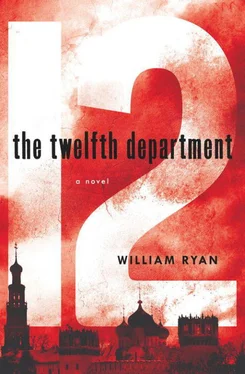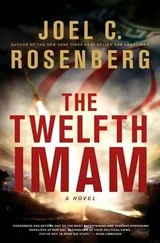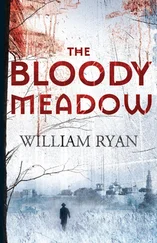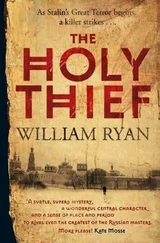“At first I was a little uncomfortable with the arrangement, Comrade Captain, as I sense you are. Our children can be tough nuts but we try to treat them well. On the other hand, we often lack staff and struggle with resources.”
“Resources?”
“Food, clothing, textbooks, blankets. Not always—but when things run short it seems we’re often as not at the back of the queue when it comes to allocations. Shoes are always a problem, but they are for everyone, I suppose. The Azarov Institute has no such problems—the food the children get over there is first class—and the chosen boys, the ones selected for permanent transfer, they get sent brand-new clothing before they even leave, and a suitcase of the finest quality. I’ve seen them with my own eyes. Such suitcases.”
Suitcases were one of many things it was impossible to obtain these days. Korolev could understand why Spinsky had been impressed.
“So the children want to go—they know it’s important work, that the professor is our top man when it comes to brains. And they believe, if what he says is right, that they’ll be the leaders of the future, thanks to his efforts. That he’ll mold them into little Stalins.”
Korolev didn’t think that Spinsky’s prodigies would have been so excited if they’d seen the parts of the Azarov Institute Korolev had visited that afternoon.
“How many children have you transferred there?” Korolev asked, turning the pages of the ledger. There seemed to be at least one “A” on every page—and there were a lot of pages.
“Quite a few, I should think. Over fifty anyway. I haven’t added the numbers up.”
When Korolev and Dubinkin had left the Azarov Institute that afternoon, there’d only been two lonely guards still there—and even they’d been asking when they could leave as well.
“I’ve been to the Azarov Institute, I didn’t see any children there.”
“The institute has another facility, just outside of Moscow, I believe. I don’t know exactly where—Madame Azarova tells me it’s a wonderful place though, out near Lefortovo. I almost wish I could go there myself sometimes. Like a palace, she says.”
But Spinsky’s eyes told a different story and Korolev wondered what he knew and what he didn’t. He promised himself he’d be paying him a return visit if things turned out to be as bad as Korolev had a feeling they might be.
“Thank you. I need to use your phone now, if you don’t mind. In private.”
“Help yourself,” Spinsky said, and Korolev had the impression he was glad the interview was over.
* * *
Yasimov’s family lived right beside the shared kommunalka phone and his son answered. Yasimov himself was soon on the other end of the line.
“With Goldstein and a youngster called Petrov, you say? That fits in with the station sighting. Could Yuri have known they were going to leg it from the orphanage in advance?”
“I don’t know. Maybe. Maybe he just ran into them by chance—at the station perhaps. And the rest followed on from that.”
“I remember that youngster, Goldstein. Red hair, runt.”
“Bigger now, but still has the red hair. Cut short, of course—they keep the children’s hair trim here.”
“Mmmm. And Petrov—taller, brown hair, also with a close-shaved head, you say? It could be them. It sounds like them.”
“I’ve photographs. And I’ve a hunch I know where they might be going. This Azarov Institute had a home for children attached to it—two of his gang were transferred there. Somewhere out near Lefortovo, and I half-wonder if Goldstein doesn’t plan to spring them.”
He didn’t add that there was every chance the place no longer existed, like the institute itself—but Goldstein couldn’t know that might be the case.
“Another thing—there’s a sergeant called Pushkin over in Razin street.”
“Pushkin?” Korolev could hear the bemusement in Yasimov’s voice.
“I think he finds it as odd as you do. Anyway, he knows Goldstein—and probably knows his haunts as well. There was an old stable they used—I don’t know if it’s still there. Look him up.”
“I’ll do it now, brother,” Yasimov said. “This very minute.”
“Listen, Mitya. I’ve a problem here, but if I can slip away—I will.”
Korolev thought about the men in the Emka outside. With a bit of luck he might find a way to drop them.
“If you can, you can. If not, don’t worry.”
Korolev felt a little glow of optimism—the Goldstein connection was the first real clue they’d had as to where his son might be.
* * *
The director had left him with the telephone, no doubt planning to reacquaint himself with his dinner as quickly as possible. When Korolev hung up he gathered the boys’ files together and opened the door—and was almost crushed by a surprised Little Barrel stumbling into the room.
“What the hell?” he managed to say, startled more than frightened. But almost instinctively, his hand had reached for his gun and there it was, snug in his hand.
“The director told me to stand here.”
But if Korolev was any judge it wasn’t just shyness that was preventing her from meeting his eyes.
“You were listening.” It came out as a statement rather than a question.
“I have ears,” the girl said, her head hanging with shame. “They do the listening.”
Korolev sighed, replacing the Walther in his holster. He found himself patting her elbow.
“Ears do that, they’re tricky things. Come on, I need to go home—you’d better let me out.”
“Of course, Comrade Captain. Thank you. You won’t tell him, will you?”
“No, of course not. How much did you hear?”
“About your son. About Kim and Petya. About that place.”
Petya must be Petrov.
“What place are you talking about?”
“The place in the woods, the place where they send them—out near Lefortovo. I keep them safe here—no one hurts them.” She looked up at him, her eyes fierce. “I look after them.”
“But it’s different at this other place?”
“Yes.”
And Korolev saw a teardrop, a huge teardrop, form at the corner of her eye.
When Korolev came out of the orphanage he found the Emka had been replaced with another car—a Ford—and two new Chekists as well. He looked at them and they looked back—alert and wide awake—and Korolev felt the tiredness drag at him and realized it would be pointless to try to shake them off.
He drove through the still summer-warm streets with fear for his son’s well-being weighing heavily on him once again—that glimmer of optimism not quite so strong after Little Barrel’s warning. He’d tried to get her to tell him more, but then she’d clammed up so tight he might as well have been talking to himself—and so now he found himself worrying over the little she had said, like a dog with a bone, and not much liking the taste of it. Outside the streets were full of Muscovites enjoying the warmth of the evening, some staggering with drink, others just out to stretch their legs rather than stay put in some sweltering little box that had been carved out of an already over-crowded kommunalka just for them. But Korolev looked through them all—the only person he had eyes for was Yuri.
* * *
By the time he’d reached Bolshoi Nikolo-Vorobinsky, his thoughts had turned against himself. What kind of man was he? That he’d managed to put his own son at risk? He’d known for a year now that this job of his came with compromises, yet he’d usually done his best to avoid them. Why? And what was more, he’d known the job itself was a dangerous one—twice in the last twelve months he’d been close to disaster. And he’d known the risks weren’t only being taken by him—every morning he saw the queue of ordinary citizens outside Petrovka, waiting to find out from the records office which prison a relative had been sent to. And yet still he carried on trying to bring an antiquated version of justice to a society that thought telling a joke about the leadership a more serious crime than murder. He could have asked to do something else, training youngsters perhaps—he’d earned it, after all. Instead he’d carried on, putting his head deeper and deeper into the lion’s mouth. He could see now it had been selfish. If he got Yuri back he’d give it up, work in a factory if needs be, and keep his head where it belonged—intact and on his shoulders.
Читать дальше












